Custom AI Solutions: Why They’re a Smart Investment (+ 9 Uses)
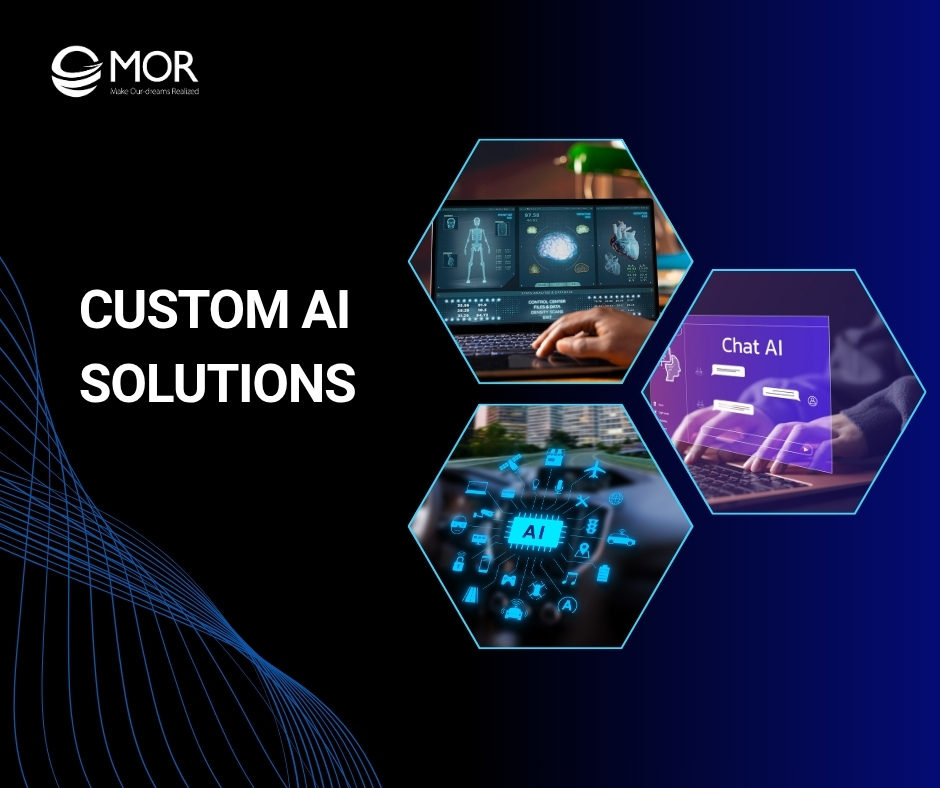
Every business hits a point where off-the-shelf AI tools just don’t cut it anymore. That’s when custom AI solutions become more than a nice-to-have. They become the smarter move. This MOR Software’s guide breaks down how custom AI business solutions help you solve complex problems, scale faster, and stay ahead of the curve.
What Are Custom AI Solutions?
Custom AI solutions are built specifically for your business, not borrowed, not pre-packed. Every model, every dataset, every workflow is shaped to match your goals, processes, and industry challenges.
More than three-quarters of companies now apply AI in at least one business function, showing how quickly tailored systems are becoming mainstream
They’re not just compatible with your existing systems. They’re built to fit right in. That means cleaner integration, better data accuracy, and decisions that actually support your operations, not just automate them.
Analysts at Gartner add that by 2026 over 80% of enterprises will be running generative-AI models or APIs in production, further widening the gap between generic tools and purpose-built platforms.
So why not just grab something off the shelf?
You could. And for smaller, simpler use cases, a generic AI tool might get the job done. But when your needs are unique or your workflows are complex, custom AI business solutions give you far more value.
They adapt to your systems, not the other way around. That makes them a smarter long-term move, especially when precision, control, and scalability matter.
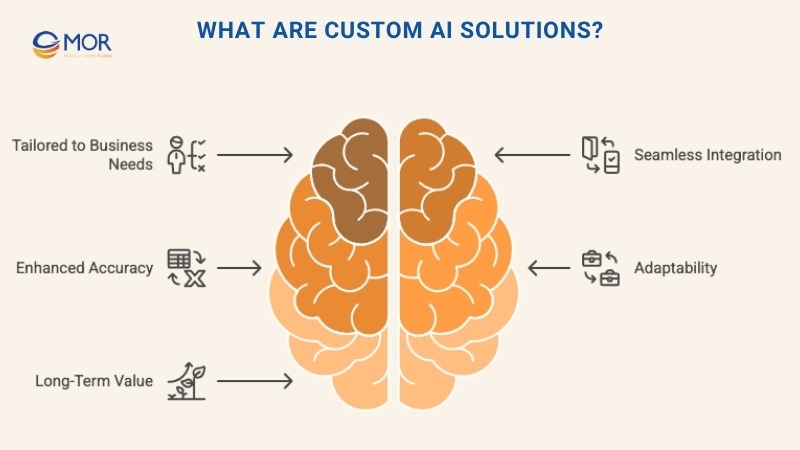
What Are Custom AI Solutions?
Key Benefits Of Custom AI Solutions For Your Business
Off-the-shelf tools might get you started, but they rarely take you far. Custom AI solutions give your business the power to solve specific problems, stay in control, and scale with confidence. Here’s what makes them a smarter long-term investment:
- Precise alignment: Pre-built tools serve general use cases. Custom AI is built around your exact goals, workflows, and data, so it performs the way your team actually works. This means better results, faster adoption, and fewer workarounds. Deloitte found that one in five companies now earns returns above 30% on their most advanced AI projects.
- Ownership and control: With a custom solution, you fully own the code, models, and intellectual property. That means no recurring license fees, no vendor lock-in, and no risk of losing access if a third-party tool changes or shuts down. Accenture research shows 77% of executives believe true benefits only emerge when AI is built on foundations they trust.
- Scalability and flexibility: As your business grows, your AI grows with it. Custom AI can adapt to shifting strategies, new data sources, and added complexity without needing to start from scratch. That makes it a better long-term investment than static, off-the-shelf tools.
- Enhanced privacy and security: Your data stays in your environment, not on a shared vendor platform. For industries like healthcare, finance, or legal, that level of control is critical for meeting compliance and security requirements.
- Superior performance on niche tasks: Generic AI tools are built for broad use. Custom solutions are trained on your data, in your domain, to handle specific problems that others can’t. Accenture also projects that leading adopters can lift overall workforce productivity by about 20% once these systems are scaled.
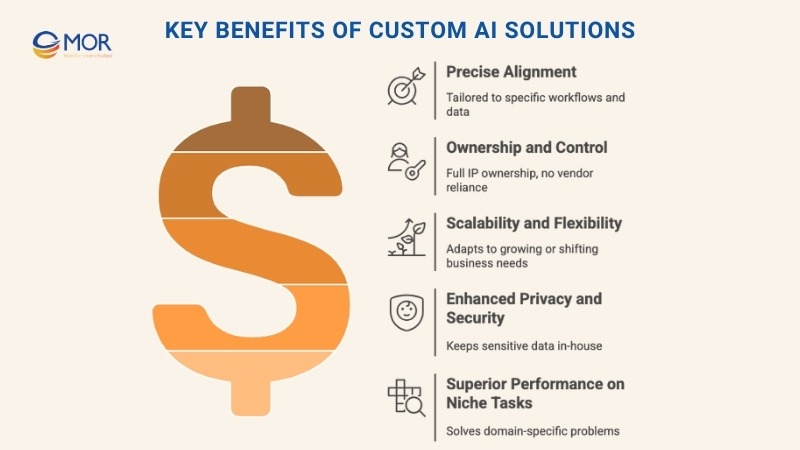
Key Benefits Of Custom AI Solutions For Your Business
Comparing Custom AI Solutions vs Ready-Made vs Hybrid
There’s no one-size-fits-all approach when it comes to AI adoption. Depending on your goals, budget, and technical setup, you might lean toward custom AI solutions, ready-made tools, or a hybrid of both. The table below breaks down how each option stacks up.
Type | Description | Pros | Cons |
| Custom AI | Built specifically to meet your business’s unique requirements | Highly tailored, full ownership, scalable, secure, precise | Higher cost, longer development time |
| Ready-made AI | Pre-built tools from major vendors (e.g., Google, Microsoft) | Fast deployment, lower upfront cost | Limited customization, vendor lock-in |
| Hybrid AI | Combines pre-built platforms with custom components | Balance of flexibility and speed, cost-efficient | Still somewhat limited in flexibility |
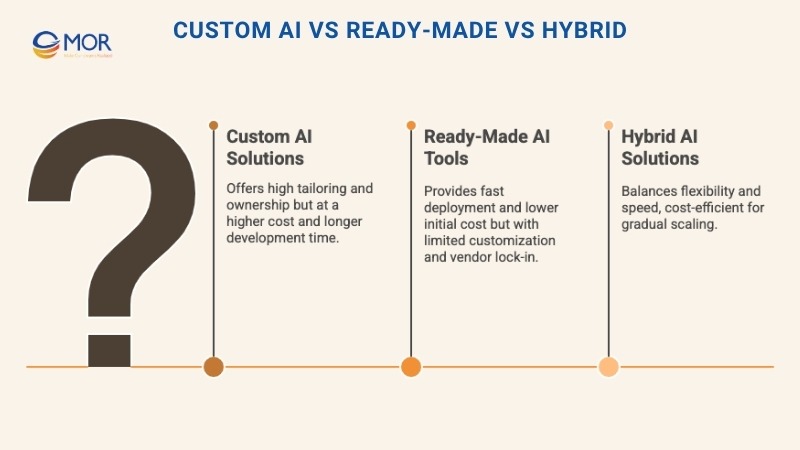
Comparing Custom AI Solutions vs Ready-Made vs Hybrid
When Should Your Business Invest In Custom AI Solutions?
Deciding when to move from generic AI to custom AI solutions depends on how complex your business has become, and how much more value you expect from your systems. We’ve broken down four key signs that it’s time to invest.
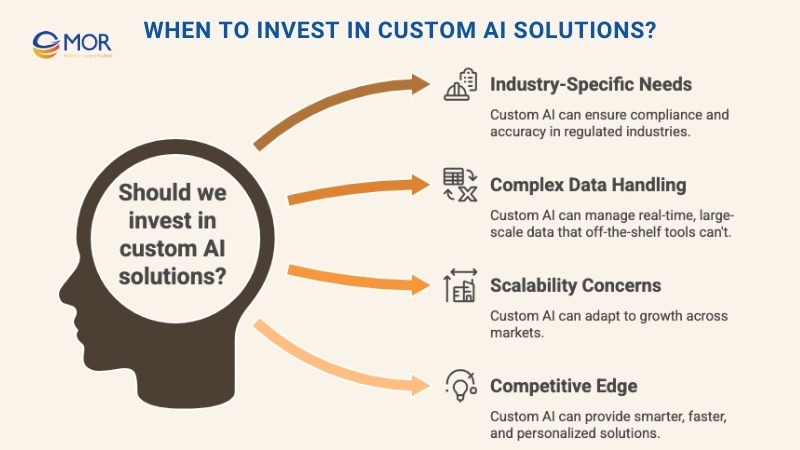
When Should Your Business Invest In Custom AI Solutions?
When Industry Demands Are Too Specific
Some sectors don’t fit the one-size-fits-all mold. Take healthcare or legal. A clinic handling patient diagnostics, or a law firm reviewing hundreds of case files, can’t afford inaccuracies or delays.
A 2025 American Medical Association survey shows that 66% of physicians already rely on AI for at least one clinical or administrative task, up 78% from the previous year. This shows the appetite for specialized tools that meet strict standards.
Custom AI solution models let you train on your own data, aligned with internal policies and external regulations. That’s how AI customer service solutions for small businesses in regulated fields stay compliant while speeding up daily workflows.
When Data Is Complex Or High-Volume
If you’re managing real-time shipping data, financial trades, or sensor signals from thousands of devices, pre-built tools will eventually hit a wall. They weren’t made for your setup.
IDC expects the global datasphere to swell to roughly 175 zettabytes by 2025, while IoT devices alone could generate 90 zettabytes of data per year. This makes bespoke data pipelines essential.
With customized AI, your system can sort massive datasets in real time. It can spot patterns, make forecasts, and auto-correct without being told. Think of it as a personalized AI engine that evolves with your business rules and logic.
When Scalability Is a Priority
Growth brings chaos if your systems can’t keep up. A static AI tool might work with small data today, but struggle next quarter when operations expand across regions or product lines.
Custom AI software is built to scale. It adjusts to shifting KPIs, data pipelines, and evolving strategies. A retail business using out-of-the-box search tools today can move to a custom AI solution for deep recommendations once customer behavior becomes more varied.
When Competitive Edge Is Non-Negotiable
In fast-moving markets, being 5% faster or 10% smarter makes a big difference. Pre-built AI won’t give you that. Your competitors likely have it too. Accenture notes that 75% of knowledge workers now tap generative AI on the job. This means unique data and models are what set leaders apart.
AI services that are trained on your proprietary datasets, customer behavior, or internal metrics offer something no one else has, an edge. That could be better targeting, smarter workflows, or deeper customer personalization. And it’s all powered by your own AI custom solutions.
Real-World Uses Of Custom AI Solutions For Business Growth
The demand for custom AI solutions keeps growing as industries move toward smarter, more automated systems. In fact, the global AI market is projected to reach nearly $1.8 trillion by 2030. That growth is tied directly to how businesses are embedding AI into real processes, customer support, logistics, hiring, forecasting, and more.
Whether you’re trying to improve service quality, make faster decisions, or free up internal resources, AI customer service solutions and other tailored use cases offer practical value today.
Let’s look at one of the most common starting points.
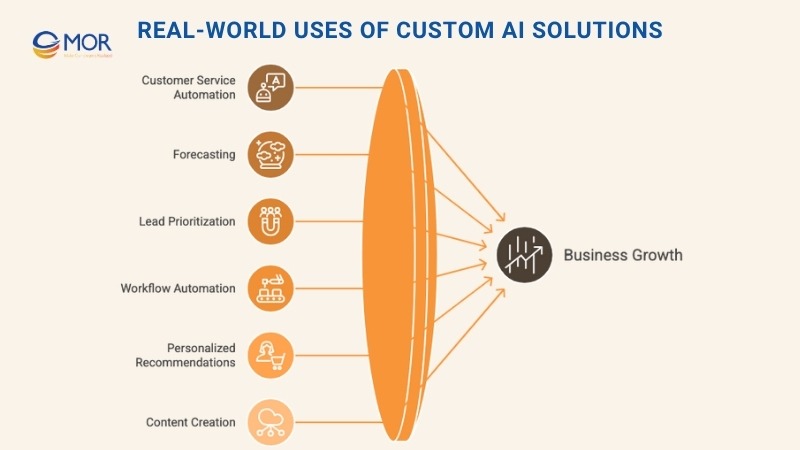
Real-World Uses Of Custom AI Solutions For Business Growth
Smarter Customer Service With AI
Now picture a support rep who works 24/7, never loses patience, and learns from every customer it meets. That’s what a custom-trained AI assistant brings to the table.
Using tools like LLMs and platforms such as Botpress, businesses can create bots that handle live chat, FAQs, and sentiment tracking. These bots learn from user input, social media, and reviews to adjust tone and offer better answers. That’s not just responsive support, it’s intelligent, real-time service.
Take Akillion’s case. They built a custom assistant that processed natural language queries and turned them into quick filters for user data. The tool helped teams access segmented data faster, while also offering instant alerts and access to a connected knowledge base.
A real quote from John Wilson, CEO of Wilson Plumbing & Heating drives it home:
“One example is our scheduling system. After using AI, we cut scheduling errors by 40%. This saved us time and made our customers happier, leading to a 25% increase in repeat business.”
This isn’t science fiction. It’s what well-planned AI consulting can deliver right now, better experiences, cleaner operations, and more repeat customers.
More Accurate Forecasting With Custom AI
Forecasting doesn’t have to be a guessing game. With custom AI solutions, you can turn historical patterns and market signals into clear predictions that drive smarter planning.
Sales, inventory, staffing, demand, whatever you're tracking, AI models can process large volumes of past data and blend it with real-time signals like weather, promotions, or competitor activity. That’s how teams cut errors and respond faster. In fact, McKinsey reports that AI-driven forecasting can reduce errors by up to 50% in some industries.
This isn’t just theory. Companies like Analytic Edge are already applying custom AI solution setups that combine live market feeds with internal sales records to anticipate shifts early. They use this insight to balance inventory, align resources, and stay ahead of change.
Premier Staff also saw the benefits. Their CEO, Daniel Meursing shared:
“One of our most successful AI integrations has been in predictive staffing. By analyzing historical data and current trends, our AI can forecast staffing needs for upcoming events with remarkable accuracy. This has allowed us to reduce overstaffing by 15% while ensuring we’re never caught short-handed, even for last-minute requests from clients like Justin Bieber or Lady Gaga.”
With proper AI solution development, businesses can move from reactive to proactive. That’s what forecasting should feel like, controlled, confident, and forward-looking.
AI For Lead Prioritization And Sales Efficiency
Chasing every lead burns time. The smarter move is to chase the right ones, and custom AI solutions make that possible.
By applying predictive modeling, AI custom solutions can automatically score leads based on how likely they are to convert. The system looks at behavioral signals, engagement history, and demographic details to prioritize where your sales team should focus. No more guesswork. Just a ranked list of warm leads, ready for action.
Landbot.io does this well. They use AI to automate lead scoring, pulling from real-time user behavior to highlight promising prospects. That means sales reps don’t waste energy on low-quality traffic. They work smarter and close faster.
Rocket Alumni Solutions also leaned on AI to boost performance. Their CEO/founder, Chase Mckee shared:
“We use predictive lead scoring to determine which prospects have the highest potential to become clients. Our AI analyzes thousands of data points from website visits, marketing engagement, and social media activity to identify key buying signals from potential customers. For example, one university showed a spike in website traffic around our award recognition software. Though not initially a good fit, our AI identified them as a high-potential lead. Within 3 months, they became our largest client, contributing over $1M in revenue.”
This is where partnering with the right custom AI development company pays off. You don’t just get automation, you get better deals, faster pipelines, and a more focused sales strategy.
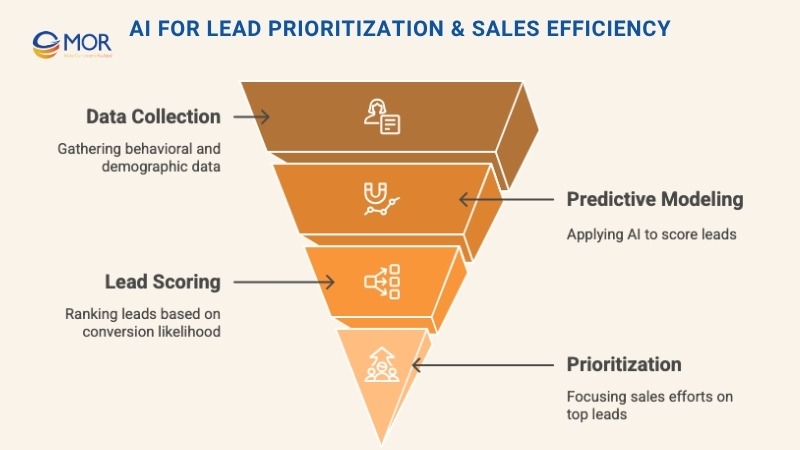
AI For Lead Prioritization And Sales Efficiency
Automating Repetitive Workflows With AI
Manual work slows teams down. Tasks like data entry, invoice processing, and order fulfillment can quietly eat up hours every week. That’s time better spent elsewhere.
With custom AI solutions, you can hand off repetitive tasks to systems that run faster, make fewer mistakes, and never need a break. These tools don’t just reduce manual work, they help your team shift focus to higher-value tasks that actually grow the business.
Companies like UiPath lead the way in AI-powered customs solutions that handle tasks like invoice approvals or form validation. Their automation tech lets businesses clean up backend processes and free their staff from endless copy-paste cycles.
That’s the real advantage of custom AI in workflow automation. You save time, cut down on errors, and let people focus on what actually needs human input. Simple changes here can lead to massive gains across operations.
Personalized Recommendations Using AI
Today’s users expect more than one-size-fits-all. That’s where custom AI solutions step in to deliver personalization that actually works.
By using behavior tracking, purchase history, and user preferences, businesses can build smart recommendation engines that suggest the right product or content, at the right time. This kind of tailored experience doesn’t just improve engagement. It drives more clicks, more purchases, and more loyalty.
These systems also play a big role in web experiences. With AI for customer support solutions, websites can adjust layouts, messaging, or offers based on real-time user behavior. Every visit becomes more relevant.
Amazon leads by example. Its AI-powered recommendation engine tracks what you browse, what you buy, and what you ignore. That data helps it suggest products with high conversion potential, boosting both sales and user satisfaction.
Premier Staff also tapped into personalization. Their CEO, Daniel Meursing shared:
“When staffing a recent Bentley launch party, our AI suggested a mix of experienced luxury car enthusiasts and top-performing brand ambassadors. The result? A 30% increase in positive client feedback and a 25% boost in staff satisfaction rates. It was like watching a symphony come together, with each player perfectly suited to their role.”
This kind of result only comes from well-built custom AI software that understands your audience, and adapts to it in real time.
Content Creation At Scale With Generative AI
Writing takes time. Scaling that across websites, emails, ads, and docs? Even more. That’s where custom AI solutions focused on content generation start pulling their weight.
By tapping into Large Language Models (LLMs), businesses can automate everything from product descriptions to marketing copy and technical documentation. With the right prompts and structure, the AI delivers content that stays on-brand, reads naturally, and gets the job done.
This kind of tech isn’t just for marketers. In healthcare, AI-powered customs solutions are being tested to generate patient summaries and even assist with medical research documentation, saving professionals hours while boosting accuracy.
Jasper.ai is a strong example. It uses custom AI development techniques to build tools that craft full blog posts, social media captions, and email campaigns. It even helps refine tone and align messaging across different channels, ideal for teams juggling multiple platforms and brand voices.
With the right setup, content creation goes from being a bottleneck to a smooth, scalable process.
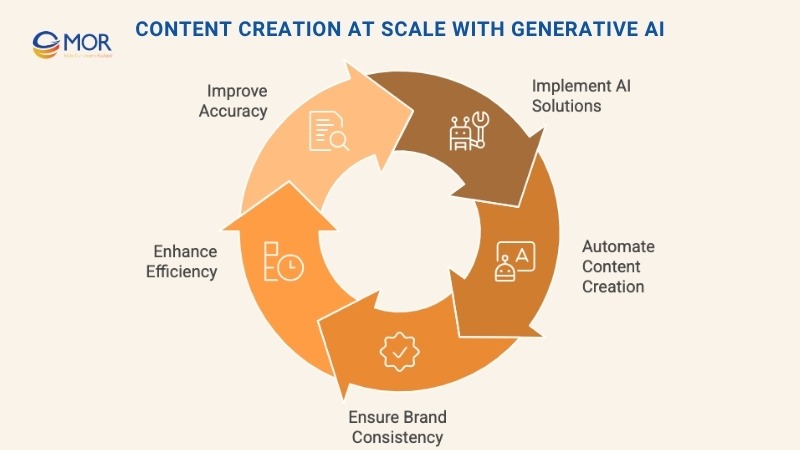
Content Creation At Scale With Generative AI
Custom AI Solutions For Hiring And Talent Screening
Hiring takes time. Screening piles of resumes, assessing skills, and comparing candidates can stretch your team thin. Custom AI solutions now help automate key parts of this process, without cutting corners.
AI can scan resumes, flag top candidates, and even run skill-based assessments. It helps teams spot patterns that indicate long-term success, not just short-term fit. You get more consistency in evaluations, fewer human errors, and faster turnaround times.
One standout use case comes from Codeaid. They worked with Scopic to build an AI Interviewer that grades coding challenges in real time. The system scores candidates against set benchmarks and offers instant feedback, cutting out delays and subjectivity.
These types of custom AI tools are becoming essential in technical recruiting. They ensure faster screening and better candidate insights, even before the first call.
And while we often think of AI customer service solutions helping end users, they’re just as effective when applied internally, to streamline and improve how your business finds and hires the right people.
Financial Guidance With AI-Powered Advisors
In finance, accuracy and personalization matter. That’s why many firms now rely on custom AI solutions to offer automated investment advice tailored to individual goals, risk levels, and timelines.
These tools, often called robo-advisors, use smart algorithms to manage portfolios, rebalance investments, and recommend strategy changes, all without the high fees or delays that come with traditional advisors. You get data-driven decisions, on-demand support, and better access to financial planning.
Platforms like Betterment lead in this space. Their robo-advisors evaluate each user’s profile and build a strategy that fits, whether it’s saving for retirement or managing day-to-day wealth. The tech delivers personalized advice with minimal friction.
While this may sound like a big-bank feature, the same approach is showing value in smaller operations. AI customer service solutions for small businesses often include financial bots that help business owners track spending, set budgets, and even plan for tax season.
With the right AI services, smart financial advice becomes more than just a luxury, it becomes the norm.
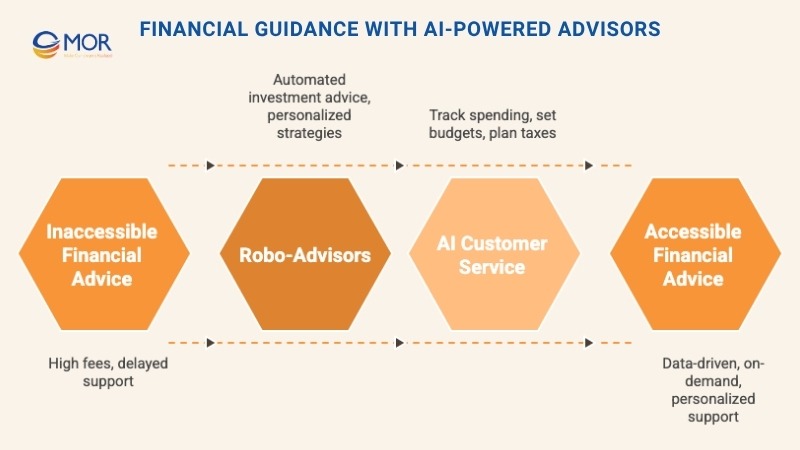
Financial Guidance With AI-Powered Advisors
AI Tools For Legal Document Review
Legal teams deal with strict deadlines and dense paperwork. That’s exactly where custom AI solutions can deliver real impact, by speeding up reviews, cutting errors, and freeing up time.
With smart tools in place, custom AI software can scan contracts, spot risks, and flag inconsistencies within seconds. These AI legal assistants follow your organization’s rules and industry standards, helping you stay compliant while working faster.
LawGeex is one example. Their platform reads contracts, compares them to standard legal frameworks, and highlights potential red flags, all before a human even looks at it. That makes negotiations quicker and reduces the chance of costly oversights.
And while many think of AI customer service solutions as client-facing, legal ops show that AI works just as well behind the scenes, bringing accuracy and speed to one of the most detail-heavy departments in business.
Key Phases In Building Your Own Custom AI Solutions
Creating your own custom AI solutions can lead to major improvements in how your business operates, but building them the right way takes structure, not shortcuts.
Each phase, from identifying problems to deploying working models, needs attention to detail. Whether you're building a smart assistant, a predictive model, or automation for operations, the same core steps apply.
We’ve broken down what those steps look like when building effective custom AI business solutions.
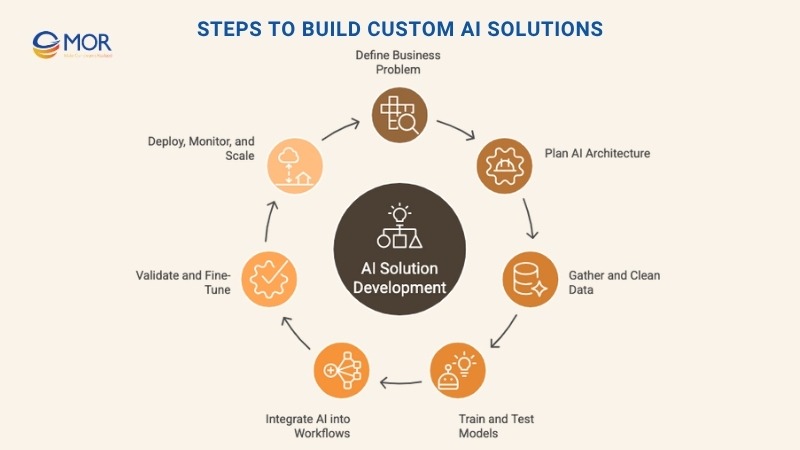
Key Phases In Building Your Own Custom AI Solutions
Define The Business Problem
Every smart build starts with a clear problem. Before any code is written, figure out what you're solving, and why it matters.
This stage sets the focus. Do you need faster support? Better forecasting? Less manual work? Once you know the pain points, you can link your AI software development plan directly to your business outcomes.
Think in terms of value, not just tech. A good AI system doesn’t just work, it supports your growth, your team, and your goals.
Plan The AI Architecture
Next comes the blueprint. At this stage, your team selects tools, designs models, and decides how the AI will actually function.
You’ll want to map out algorithms, workflows, and data inputs. Whether it’s traditional machine learning or something newer like generative AI, the tech needs to fit the job.
Close collaboration with business stakeholders is key. The more aligned the architecture is with your actual processes, the smoother development and rollout will be later.
Gather And Clean The Data
Every AI system is only as smart as the data behind it. For custom AI solutions to work well, you need clean, reliable, and relevant data.
This phase is all about collecting the right data, removing errors, and organizing it for model training. That includes tagging, formatting, and validating every record, so your AI learns from examples that reflect real business needs.
If your data is scattered, outdated, or full of noise, your results will be too. But if it's well-prepped, your custom AI models will deliver faster, sharper predictions.
Whether you’re building internal tools or AI customer service solutions, getting this step right is what separates projects that succeed from those that stall.
Train And Test The Models
Once your data is clean, it’s time to bring your custom AI solutions to life through training.
This step involves choosing the right algorithms and training your models to solve the specific problem at hand. Whether you're building for recommendations, automation, or predictions, the models need to reflect your real-world needs.
You’ll use your labeled data to train and refine performance, testing as you go. It’s an iterative process, each round of feedback helps sharpen accuracy. With well-managed AI custom solutions, your system doesn’t just work, it improves the more you use it.
Solid AI solution development here lays the foundation for results that are scalable and future-proof.
Integrate AI Into Workflows
Even the smartest custom AI solutions won’t deliver value if they don’t work well with your current tools.
This stage is about plugging your custom AI solution into your existing systems, whether that means connecting it to CRMs, ERPs, or internal dashboards. It often involves building APIs, syncing data pipelines, and adjusting logic so everything runs smoothly.
The goal? No disruptions. Just a smarter system that fits right in.
When done right, integration allows your team to start benefiting from AI without having to change how they work. A good custom AI development company makes sure the handoff between human and machine is seamless, efficient, and built for real-world use.
Validate And Fine-Tune
Before you deploy, your custom AI solutions need to be put through real testing, not just basic checks.
This stage includes stress tests, A/B experiments, and validation runs to make sure the system performs reliably under different conditions. You’re looking to spot issues early, catch edge cases, and fine-tune behavior before it reaches users.
The purpose is twofold: fix what’s broken and confirm that your custom AI business solutions actually support the goals you set at the start. Skipping this step leads to risk. Running it well sets you up for long-term success.
It’s one of the most important phases in delivering reliable AI services that work where and when you need them.
Deploy, Monitor, And Scale
Once your custom AI solutions pass testing, it's time to launch them into production and prepare for real use.
Today, deployment is often handled through cloud platforms like AWS SageMaker, which makes it easier to integrate with your systems and support ongoing updates. These tools help automate release cycles, monitor performance, and retrain models without starting from scratch.
With the right setup and custom AI development practices, your solution can scale with your business. That means handling more users, more data, and more complexity, without a drop in performance.
By following MLOps best practices and using trusted tools like AI-powered customs solutions, your models stay current, responsive, and ready for what’s next. Continuous monitoring keeps things running smoothly while adapting to new patterns over time.
Our Expertise In Custom AI Solutions
At MOR Software, we build custom AI solutions that solve real business problems, not just technical challenges. With years of hands-on experience across diverse industries, we help organizations go beyond off-the-shelf tools by delivering AI systems that are built for their exact needs, workflows, and data.
Our teams don’t just write code. They partner with you from start to finish. That means we help define the right use cases, select the best algorithms, and align everything with your long-term strategy.
Whether you're looking to improve internal operations, personalize customer experiences, or automate decision-making, we tailor every solution to your business goals.
We specialize in:
- Custom AI model development: From predictive analytics to behavior-based engines, we build and train models using your real-world data.
- Generative AI applications: Automating content generation, product recommendations, or smart assistants built on LLMs.
- Machine learning engineering: End-to-end pipelines with training, testing, and optimization for measurable performance.
- AI integration: Seamless connection of AI models with your current systems using APIs, cloud platforms, or legacy infrastructure.
- Cloud-based AI deployment: We work across AWS, Azure, and Google Cloud to deliver scalable, secure AI environments.
- Ongoing support and evolution: AI models improve over time. We stick around to fine-tune, retrain, and support your system as your business grows.
We’re not a vendor, we’re your technical partner. With our experience in custom development, cloud-native platforms, and Agile delivery, we help companies turn bold AI ideas into stable, production-ready solutions that actually deliver value.
Conclusion
Whether you're improving service, speeding up workflows, or making smarter decisions, custom AI solutions give you more control and better results than off-the-shelf tools ever could. From early planning to full deployment, these systems are built to match your business, not the other way around.
At MOR Software, we build AI-powered customs solutions that actually work in real business environments. With deep experience in AI services and tailored development, we’re here to help you move from idea to impact.
Contact us to explore how MOR Software can help bring your AI vision to life.
Rate this article
0
over 5.0 based on 0 reviews
Your rating on this news:
Name
*Email
*Write your comment
*Send your comment
1